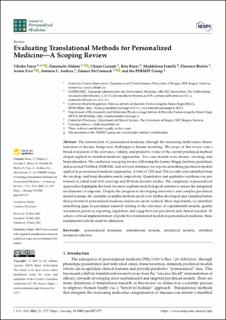| dc.description.abstract | The introduction of personalized medicine, through the increasing multi-omics characterization of disease, brings new challenges to disease modeling. The scope of this review was a broad evaluation of the relevance, validity, and predictive value of the current preclinical methodologies applied in stratified medicine approaches. Two case models were chosen: oncology and brain disorders. We conducted a scoping review, following the Joanna Briggs Institute guidelines, and searched PubMed, EMBASE, and relevant databases for reports describing preclinical models applied in personalized medicine approaches. A total of 1292 and 1516 records were identified from the oncology and brain disorders search, respectively. Quantitative and qualitative synthesis was performed on a final total of 63 oncology and 94 brain disorder studies. The complexity of personalized approaches highlights the need for more sophisticated biological systems to assess the integrated mechanisms of response. Despite the progress in developing innovative and complex preclinical model systems, the currently available methods need to be further developed and validated before their potential in personalized medicine endeavors can be realized. More importantly, we identified underlying gaps in preclinical research relating to the relevance of experimental models, quality assessment practices, reporting, regulation, and a gap between preclinical and clinical research. To achieve a broad implementation of predictive translational models in personalized medicine, these fundamental deficits must be addressed. | en_US |

